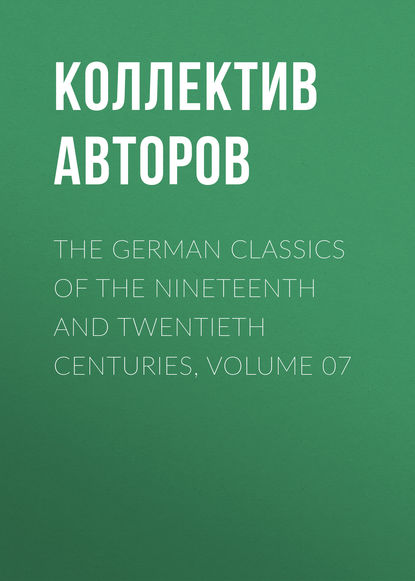По всем вопросам обращайтесь на: info@litportal.ru
(©) 2003-2024.
✖
The German Classics of the Nineteenth and Twentieth Centuries, Volume 07
Настройки чтения
Размер шрифта
Высота строк
Поля
KARL FERDINAND GUTZKOW
SWORD AND QUEUE (1843)
TRANSLATED BY GRACE ISABEL COLBRON
PREFACE OF THE AUTHOR
The essence of the comic is self-contradiction, contrast. Even professional estheticians must acknowledge that by the very nature of its origin the following comedy answers this definition.
A king lacking the customary attributes of his station; a royal court governed by the rules that regulate any simple middle-class household—surely here is a contradiction sufficient in itself to attract the Comic Muse. And it was indeed only when the author was well along in his work that he felt any inclination to introduce a few political allusions with what is called a "definite purpose," into a work inspired by the principles of pure comedy.
Ever since the example set by those great Greeks, Æschylus and Aristophanes, the stage has claimed the right to deal with extremes. He who, sinning and laden with the burden of human guilt, has once fallen a victim to the Eumenides, cannot, as a figure in a drama, go off on pleasure trips, nor can he go about the usual business of daily life. Fate seizes him red-handed, causes him to see blood in every glass of champagne and to read his warrant of arrest on every chance scrap of paper. And the Comic Muse is even less indulgent. When Aristophanes would mock the creations of Euripides, which are meant to move the public by their declining fortunes, he at once turns the tragedian into a rag-picker.
Comedy may, tragedy must, exaggerate. The exaggerations in Sword and Queue brought forth many a contemptuous grimace from the higher-priced seats in the Court Theatres. But it needs only a perusal of the Memoirs of the Markgravine of Baireuth, Princess of Prussia, to give the grotesque picture a certificate of historical veracity. Not only the character-drawing, but the very plot, is founded on those Memoirs, written in a less sophisticated age than our own, and the authenticity of which is undisputed.
In the case of Seckendorf, the technical, or, I might say, the symphonic composition of the play, which allots the parts as arbitrarily as in the Midsummer Night's Dream does Peter Quince, who says to highly respectable people: "You play the Lion, and you play the Ass," necessitates making a victim of a man who was a mediocre diplomat, but for a time, at least, a fairly good soldier. The author feels no compunction on this score. Stupidity, as Comus artlessly thinks, is not wickedness; the Lion or the Ass—each is necessary to different moments in the play. A Brandenburg-Prussian comedy of 1733 can, a priori, hardly fail to be "unjust" to an Imperial Ambassador of that epoch. Such injustice belongs to the native wantonness of the Comic Muse. In plays of a specifically Austrian character, Prussia, and especially the people of Berlin, have suffered the same necessary injustice of comedy. Fortunately, according to Chevalier Lang and other more reliable authorities, this particular Seckendorf was both vain and tyrannous. His hatred for Frederick II. and his eternal "combinations" went to such lengths that, during the first Silesian war, he offered the Austrian Court a detailed plan by which the "Land-hungry conqueror" might be personally rendered innocuous. (See Arneth, Maria Theresa, Vol. I).
However, Puck's manner of writing history may be softened a little. It is not necessary for the actor to present Seckendorf as an imbecile. Actors have the unfortunate habit of taking the whole hand when a finger is offered. In truth I have seen but a very few performances of my play in which Frederick William I. still retained, beneath his attitude of stern father, some share of royal dignity; in which Eversmann, despite his confident impudence, still held his tongue like a trembling lackey; in which the Hereditary Prince, despite his desire to find everything in the Castle ridiculous, still maintained a reserve sufficient to save him from being expelled from Berlin for his impertinent criticisms—or where the Princess was still proud and witty beneath her girlish simplicity. And still rarer is it to see a Seckendorf who, in spite of his clumsy "combinations," did not quite sink to the level of the Marshal von Kalb. At this point a dramaturgic hint might not come amiss. In cases where there is danger of degrading the part, the stage manager should take care to intrust such rôles to the very actors who at first thought might seem least suited for them—those whose personalities will compel them to raise the part to a higher level. The buffoon and sometimes even the finer comedian cannot free Shakespeare from the reproach of having given two kings of Denmark a clown as Prime Minister. It is very much less necessary that the audience should laugh at Polonius' quips than that the quips should in no wise impair his position as courtier, as royal adviser, as father of two excellent children, and, at the last, as a man who met death with tragic dignity. In such a case a wise manager intrusts the comic part to an actor who—is not comic.
The following play was written in the spring of 1843. Some of our readers may chance to know the little garden of the Hôtel Reichmann in Milan. In a room which opens out into the oleander bushes, the trickling fountains, and the sandstone cupids of that garden, the first four acts ripened during four weeks of work. The fifth act followed on the shores of Lake Como.
Amid surroundings which, by their beauty, bring to mind only the laws of the ideal, to hold fast to those burlesque memories from the history of the sandy Mark Brandenburg was, one may feel sure, possible only to a mind which turned in love to its Prussian home, however "treasonable" its other opinions. And yet the romanticism of San Souci, as well as the estheticism of the Berlin Board of Censors, has at all times persecuted the play, now forbidding it, again permitting an occasional performance, and again prohibiting it even after 1848. When the aged and revered Genast from Weimar had played the king a dozen times in the Friedrich-Wilhelmstädtisches Theater, Hinckeldey's messengers brought the announcement that the presentation of the piece met with disfavor in high places. Frederick William IV. did everything possible to hamper and curtail the author's ambitions. But to give truth its due, I will not neglect to mention that this last prohibition was softened by assigning as its motion the allusion made in the play to that legend of the Berlin Castle, "The White Lady," who is supposed to bring a presage of death to the Prussian royal family.
The Dresden Court Theatre was formerly a model of impartiality. And above all, Emil Devrient's energetic partisanship for the newer dramatic literature was a great assistance to authors in cases of this kind. This play, like many another, owes to his artistic zeal its introduction to those high-class theatres where alone a German dramatist finds his best encouragement and advance. Unfortunately, the war of 1866 again banished Sword and Queue from the Vienna Burgtheater, where it had won a place for itself.
* * * * *
SWORD AND QUEUE
DRAMATIS PERSONAE
FREDERICK WILLIAM I., King Of
Prussia, father of Frederick the
Great.
THE QUEEN, his wife.
PRINCESS WILHELMINE, their daughter.
THE PRINCE HEREDITARY OF BAIREUTH
GENERAL VON GRUMBKOW }
COUNT SCHWERIN } Councilors and Confidants of the King.
COUNT WARTENSLEBEN }
COUNT SECKENDORF, Imperial Ambassador
BARONET HOTHAM, Envoy of Great Britain
FRAU VON VIERECK
FRAU VON HOLZENDORF
The Queen's Ladies.
FRAÜLEIN VON SONNSFELD, Lady-in-waiting to the Princess.
EVERSMANN, the King's valet.
KAMKE, in the Queen's service.
ECKHOF, a grenadier.
A Lackey in the King's service. Generals, Officers, Court Ladies. Members of the Smoking-Circle. Grenadiers, Lackeys.
Scene of action: The Royal Castle of Berlin.
First performance, January 1st, 1844, in the Court Theatre in Dresden.
SWORD AND QUEUE
ACT I
SCENE I
A room in the Palace. One window and four doors. A table and two armchairs on the left of the room.
EVERSMANN, taking snuff comfortably. Two Drummers of the Guard.
Later FRAÜLEIN VON SONNSFELD.
The drummers take up a position near the door to the left, leading to the apartments of the PRINCESS, and execute a roll of the drums.
FRAÜLEIN VON SONNSFELD (opens the door and looks in).
That will do.
[The drummers play a second roll.]
SONNSFELD (looks in again).
Yes, yes. We heard it.
[EVERSMANN gives the sign again and the drummers play a third long roll.]

















